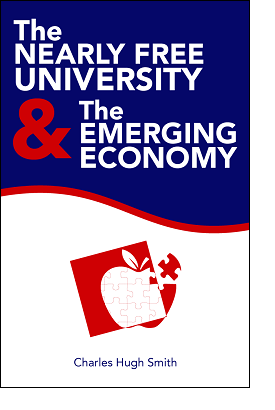Those of us who don't have time to cook every night rely on stews, soups, chili and other one-pot meals that will last a few days. One standard in our house is sambar, a spicy lentil-vegetable stew from south India. This is a vegetarian dish that offers a spectrum of spiciness, and uses readily available ingredents: potatoes, tomatoes, onions and green beans. Some of the spices will likely only be available in specialty ethnic markets (fenugreek seeds, tamarind) or online.
We use the recipe in Curried Favors: Family Recipes from South India (page 68), though there are many similar recipes online and in other cookbooks.
Curried Favors also has a classic recipe for Appam (page 34), a rice-flour pancake similar to hoppers in Sri Lanka.
The batter is left out to ferment (this is a yeast flat bread) for about 24 hours, and is poured into a well-oiled hot pan like a pancake. Unlike wheat-based yeast flatbreads, rice-flour batter becomes frothy rather than rising like a dough.

Unlike a regular wheat pancake, appam is covered and left to cook for 3-5 minutes before turning. This creates a lacy, crispy edge and a wonderful texture.

Here is a bowl of the sambar garnished with fresh cilantro and the warm appam.

Each of these dishes takes time to prep, but the sambar will feed the crew for a few days and the appam batter can also be refrigerated and cooked over several nights.
Both of these dishes happen to suit a gluten-free, meat-free diet, but the wealth of tastes and textures will appeal to a broad range of palates.
"A healthy homecooked family meal and a home garden are revolutionary acts."
The Nearly Free University and The Emerging Economy:
The Revolution in Higher Education
Reconnecting higher education, livelihoods and the economyWith the soaring cost of higher education, has the value a college degree been turned upside down? College tuition and fees are up 1000% since 1980. Half of all recent college graduates are jobless or underemployed, revealing a deep disconnect between higher education and the job market.
It is no surprise everyone is asking: Where is the return on investment? Is the assumption that higher education returns greater prosperity no longer true? And if this is the case, how does this impact you, your children and grandchildren?

We must thoroughly understand the twin revolutions now fundamentally changing our world: The true cost of higher education and an economy that seems to re-shape itself minute to minute.
The Nearly Free University and the Emerging Economy clearly describes the underlying dynamics at work - and, more importantly, lays out a new low-cost model for higher education: how digital technology is enabling a revolution in higher education that dramatically lowers costs while expanding the opportunities for students of all ages.
The Nearly Free University and the Emerging Economy provides clarity and optimism in a period of the greatest change our educational systems and society have seen, and offers everyone the tools needed to prosper in the Emerging Economy.
Read Chapter 1/Table of Contents
print ($20) Kindle ($9.95)
Things are falling apart--that is obvious. But why are they falling apart? The reasons are complex and global. Our economy and society have structural problems that cannot be solved by adding debt to debt. We are becoming poorer, not just from financial over-reach, but from fundamental forces that are not easy to identify. We will cover the five core reasons why things are falling apart:
 1. Debt and financialization
1. Debt and financialization2. Crony capitalism
3. Diminishing returns
4. Centralization
5. Technological, financial and demographic changes in our economy
Complex systems weakened by diminishing returns collapse under their own weight and are replaced by systems that are simpler, faster and affordable. If we cling to the old ways, our system will disintegrate. If we want sustainable prosperity rather than collapse, we must embrace a new model that is Decentralized, Adaptive, Transparent and Accountable (DATA).
We are not powerless. Once we accept responsibility, we become powerful.
Read the Introduction/Table of ContentsKindle: $9.95 print: $24
| Thank you, Robert B. ($72), for your magnificently generous contribution to this site -- I am greatly honored by your steadfast support and readership. | Thank you, Robert S. ($50), for your astonishingly generous contribution to this site -- I am greatly honored by your support and readership. |
